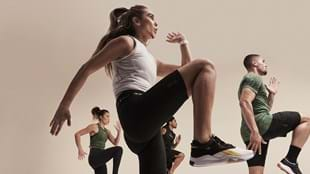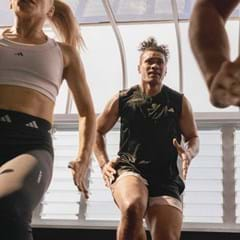Read on and you’ll discover:
• How obesity can compromise the body's immune responses and impact vaccine efficacy
• Why building physical fitness can be more effective than reducing obesity
• How physical activity protects against non-communicable and infectious diseases, such as Covid-19
Right now, all over the globe, millions of vaccinations are being administered in a bid to halt the spread of Covid-19. While there is much debate about the most effective vaccine and the most efficient rollout, one thing is clear, if you’re physically active you’re already a step ahead.
Various studies have indicated that exercise can boost the efficacy of vaccinations.
It was back in 1796 when English physician Edward Jenner introduced the world’s first vaccine. It was administered to help people’s immune systems develop protection from the devastating smallpox disease. In the years since, vaccines have provided protection from diphtheria and polio, to measles, chickenpox and influenza.
Over the years various studies have indicated that exercise can boost the efficacy of vaccinations. A University of Birmingham study showed that people who exercised their arms for a few hours before a flu jab developed a stronger immune response. A study from Germany’s Saarland University found that elite athletes showed a more pronounced immune response to flu jabs, suggesting the fitter you are, the more effective your vaccine will be.
More recently, scientists have observed one thing that can halt their impact; vaccination can be less effective in adults who are obese.
The problem with obesity and immune response
Obesity is well-known for increasing the risk of death by cardiovascular disease, but it can also cause metabolic changes too. Experts in the emerging field of immunometabolism are finding obesity interferes with the body's immune system, opening up greater risk of infection from all sorts of disease pathogens. Usually, in a healthy immune system, the body turns inflammation on and off as needed, and the inflammation sends out proteins to fight infection. Vaccines also work in this way, exploiting the body’s immune response to stimulate protection. Those who are obese usually also have metabolic risk factors, such as high blood pressure and blood sugar levels. As a result, their immune system is constantly in a state of chronic mild inflammation. This consistent mild inflammation means their immune system is constantly compromised, which could be the reason why vaccines are less effective among the obese.
While obesity-related health implications are certainly an issue, it’s physical inactivity we should be most concerned about.
Can increased physical activity reverse the inflammation caused by obesity?
There is plenty of evidence showing that physical activity reduces inflammation. So, could the anti-inflammatory effects of exercise offset any inflammation linked with obesity? And if so, could an increase in physical activity be the secret to boosting vaccine potency regardless of how much someone weighs?
Professor Mark Febbraio operates at the forefront of research into the anti-inflammatory effects of exercise and much of his work is dedicated to establishing molecular links between exercise and disease prevention. When we asked him about whether exercise could increase the potency of a vaccine in obese individuals, he said we’re far too early on in the game to draw any conclusions. He points out that while obesity-related health implications are certainly an issue, it’s physical inactivity we should be most concerned about.
Too many of us have been sitting in our houses huddled, waiting for a vaccine, instead of going out and being active and exercising, which has been the best vaccine to date. According to the Centers for Disease Control and Prevention (CDC), only half of adults get the exercise they need.
Is building physical fitness more important than reducing obesity?
Both are important, says Febbraio. But, when it comes to the risk of disease, low cardiovascular respiratory fitness is likely to present greater risk. "If you think about someone who is obese, but who is a habitual exerciser, they are more likely to have a lower disease risk than people who are lean and sedentary," explains Febbraio. This implies that increased risk is more to do with lack of physical activity than it is obesity, he says.
"If you think about someone who is obese, but who is a habitual exerciser, they are more likely to have a lower disease risk than people who are lean and sedentary," Prof. Mark Febbraio
While there’s no doubt that obesity causes chronic low-grade inflammation that is directly associated with disease, Febbraio warns against focusing on obesity too specifically. There is even something called the obesity paradox, he explains. It’s a medical hypothesis that obesity may, counterintuitively, be protective and associated with greater survival in certain groups of people, such as the elderly or those with certain chronic diseases. “If you’re an elderly person and you carry more body fat, you are actually protected against infections, particularly sepsis.” And it can be the same for post-menopausal women. “If a woman has visceral fat, that is not at all protective. If she has very low levels of fat it’s intermediately protective. And if she has high levels of subcutaneous fat, that’s the fat around the bottom and thighs, that’s actually protective.” This suggests that increased body fat is not always a bad thing.
However, this where Covid-19 again throws things up in the air.
“What’s most intriguing about SARS-CoV-2, is that if it infects an obese older person, they have a greater risk of developing ARDS, which is acute respiratory distress syndrome.” Febbraio says this is the complete opposite of what happens with a sepsis infection, which is surprising. He suspects it has to do with the fact that it's harder to breathe when you're carrying a lot of adiposity and lying down, but reiterates it’s all speculation.
“We just can’t make any statements with certainty about SARS-CoV-2 because we just don’t have the data, we don’t know enough about it right now,” says Febbraio.
SO WHAT DO WE KNOW?
- Obesity increases risk from the virus in every way. There’s a 113 percent increased risk of ending up in hospital, 74 percent more likelihood of needing intensive care, and 48 percent greater risk of death.
- Physical activity protects against non-communicable and infectious diseases, such as Covid-19.
- Anecdotally, those who are infected with Covid-19 but have superior fitness, such as professional athletes, do not seem to get seriously ill.
The fact that obesity increases Covid-19 death risk by almost 50 percent was highlighted in a brand new meta-analysis of 75 studies from across the planet. Professor Barry Popkin, who led the research, says the findings were significantly higher than anyone had thought. It also amplifies the need to ensure the vaccine will work for the significant and growing proportion of our population who are obese.
“We know a Covid vaccine will have a positive effect on obese people, but we suspect from all our knowledge from tests on the Sars vaccine and the flu vaccine it will have a diminished benefit compared to the others,” says Popkin.
Right now, we’re yet to see any hard evidence that increased fitness levels will make the Covid-19 vaccination more effective – but there is plenty of proof that physically active individuals will fare better when it comes to Covid-19 or any chronic disease.
Physical fitness is key to improved immunological fitness, the antioxidants produced during exercise can help lessen the impacts of disease, and exercise is good medicine for countering colds, cancer and Covid-19.
As many global health experts concur, physical activity is absolutely the most important medicine of our time.








